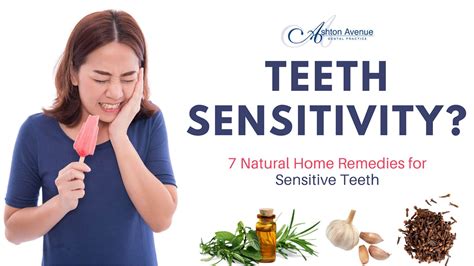Teeth Pain Relief: Cold Sensitivity Solutions

Teeth pain, particularly that triggered by cold sensitivity, can be an excruciating experience affecting daily life in significant ways. The sharp, stabbing sensation that follows the consumption of cold foods or drinks can be debilitating, limiting one’s ability to enjoy even the simplest of pleasures. Understanding the causes of cold sensitivity and exploring effective relief strategies are essential for managing and potentially overcoming this common dental issue.
At the core of cold sensitivity is the exposure of the dentin, a layer of tissue beneath the enamel of the tooth. Dentin contains tiny tubes or canals that lead to the pulp of the tooth, which is rich in nerves. When hot or cold substances come into contact with the dentin, they can cause fluid movement within these tubes, triggering nerve endings and resulting in the sensation of pain. Several factors can contribute to the exposure of dentin, including gum recession, tooth decay, cracked teeth, and worn fillings or crowns.
Identifying the Cause
Identifying the underlying cause of cold sensitivity is the first step towards finding an effective solution. This involves a thorough examination by a dental professional who can assess the condition of the teeth and gums to determine the root cause of the sensitivity. The examination may include checking for signs of gum recession, inspecting fillings and crowns for any signs of wear, and using dental tools to gently probe the teeth for any areas of decay or cracks.
Home Remedies for Relief
While a professional diagnosis is indispensable, there are several home remedies that can provide temporary relief from cold sensitivity. Desensitizing toothpaste is one of the most commonly recommended solutions. These toothpastes contain ingredients such as potassium nitrate or strontium chloride that help block the dentin tubules, reducing the fluid flow and subsequent nerve stimulation that causes pain. It’s essential to use these toothpastes as directed, usually for a period of several weeks before noticeable improvements can be felt.
Another approach is the use of fluoride gel or varnish, which can help strengthen tooth enamel and reduce sensitivity. Fluoride applications can be done at home with over-the-counter products or in a dental office for more severe cases. Additionally, good oral hygiene practices, including regular brushing and flossing with a soft-bristled toothbrush and gentle toothpaste, can prevent further enamel erosion and gum recession.
Professional Treatments
For more persistent or severe cases of cold sensitivity, professional dental treatments offer effective and long-lasting solutions. Dental bonding, which involves the application of a resin material to the affected area, can seal the dentin tubules and provide relief. Similarly, fluoride varnishes applied by a dentist can offer more potent protection against sensitivity than over-the-counter products.
In cases where cold sensitivity is due to a more significant issue such as a cracked tooth or extensive decay, treatments may involve the placement of a dental crown or the performance of a root canal to remove infected pulp tissue. These procedures not only address the sensitivity but also restore the health and integrity of the tooth.
Preventive Measures
Prevention is always the best approach to managing teeth sensitivity. Regular dental check-ups can help identify potential issues before they escalate. Maintaining good oral hygiene through proper brushing, flossing, and the use of a fluoride mouthwash can prevent the erosion of tooth enamel and the recession of gums, both of which can lead to cold sensitivity.
Choosing a soft-bristled toothbrush and avoiding harsh toothpastes or brushing techniques can also help preserve the enamel. Additionally, limiting or avoiding highly acidic foods and beverages, which can erode enamel, is recommended. In some cases, a desensitizing toothpaste may be used as a preventative measure even in the absence of current sensitivity, especially for individuals with a history of sensitive teeth.
Future Prospects
Advancements in dental technology and materials continue to offer new and innovative solutions for managing teeth sensitivity. From nano-hydroxyapatite toothpastes that help remineralize tooth enamel to laser treatments that can seal dentin tubules, the future holds promise for more effective and minimally invasive treatments.
Furthermore, increased awareness of oral health and the importance of preventive care is leading to earlier intervention and better outcomes for individuals suffering from cold sensitivity. As research into the causes and treatments of teeth sensitivity continues, it is likely that even more targeted and successful therapies will emerge, offering relief to the millions affected by this common dental issue.
Conclusion
Cold sensitivity is a treatable condition, and with the right approach, individuals can find significant relief from the pain and discomfort it causes. By understanding the underlying causes, exploring home remedies, and when necessary, seeking professional dental care, it is possible to enjoy a life free from the limitations imposed by sensitive teeth. Whether through preventive measures, desensitizing toothpastes, or more advanced dental procedures, there are solutions available for everyone, promising a future where a cold drink or a chilly winter breeze does not have to be a source of dread.
FAQ Section
What is the primary cause of cold sensitivity in teeth?
+The primary cause of cold sensitivity in teeth is the exposure of the dentin, a layer beneath the enamel, which contains tiny tubes that lead to the tooth’s pulp, triggering nerve endings when in contact with cold substances.
Can desensitizing toothpastes provide immediate relief from cold sensitivity?
+Desensitizing toothpastes can provide relief from cold sensitivity but typically require consistent use over a period of several weeks before noticeable improvements can be felt.
What role does fluoride play in preventing and treating cold sensitivity?
+Fluoride helps strengthen tooth enamel, reducing the likelihood of dentin exposure and subsequent sensitivity. It can be applied through toothpaste, mouthwashes, or professional varnishes.
Are there any natural remedies for cold sensitivity?
+While there are some natural remedies and home treatments that can offer relief, such as oil pulling or saltwater rinses, their effectiveness can vary, and they should not replace professional dental care for persistent sensitivity.
Can cold sensitivity be a sign of a more serious dental issue?
+Yes, cold sensitivity can sometimes indicate a more serious issue such as a cracked tooth, extensive decay, or gum disease. It’s essential to consult a dental professional for a proper diagnosis and appropriate treatment.


